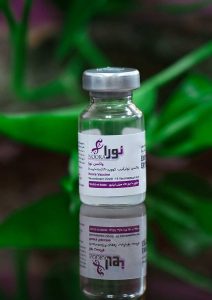
A controversial paper on the safety and immunogenicity of an Iran-made COVID-19 vaccine is being investigated by the U.S.-based publisher Wiley, Retraction Watch has learned.
Iran reportedly has already administered 3 million doses of the vaccine, dubbed Noora, which the country licensed for emergency use last year.
The paper describes the vaccine’s first test in humans, marking the only time results from the clinical development of the homegrown shot have been reported in international journals.
“Safety and immunogenicity of a recombinant receptor-binding domain-based protein subunit vaccine (Noora vaccine™) against COVID-19 in adults: A randomized, double-blind, placebo-controlled, Phase 1 trial” was published in 2022 in the Journal of Medical Virology, an achievement highlighted in Iranian news media. One report said the study showed a dose of 80 micrograms of the vaccine was “safe” and provided “adequate immunity in adults.”
But in a commentary published in May 2023, in the same journal, Donald Forthal, chief of the University of California, Irvine’s Division of Infectious Diseases, expressed surprise that “a manuscript containing so many serious flaws would have been accepted for publication following peer review, and given these issues, a retraction may be in order.”
Among several problems, Forthal wrote, was that more than 80% of the placebo group had neutralizing antibodies against SARS-CoV-2, “which is very surprising and unexpected, and raises the possibility that occult COVID‐19 infections could have confounded the results across all cohorts.”
Forthal, who studies the immune response to viral infections, also raised doubts about the serum samples from convalescent patients, which were used as a benchmark to gauge the vaccine’s ability to elicit protective antibodies:
Who are the convalescent serum donors? If they are largely asymptomatic or mildly symptomatic patients, or if they are months out from infection, the titers will be low, thereby providing a favorably biased comparator for the vaccine‐induced titers.
He added:
The results overall also raise concern about the clinical efficacy of the Noora vaccine at preventing COVID‐19 infection in a population, as 60% (9/15) of recipients of the 80 mcg dose series developed virus‐neutralizing antibody titers of less than 1/16th the level observed in most of the convalescent serum samples tested. By contrast, the Novavax recombinant spike protein vaccine generated mean virus‐neutralizing antibody titers greater than fourfold that of symptomatic COVID‐19 outpatients.
Forthal also flagged “a systematic problem with the references, as many of the citations are incorrect and not relevant to the issue discussed.” And he said a glaring conflict of interest had not been stated: Several authors were employees of Baqiyatallah University of Medical Sciences, in Iran, “which funded the study and has developed the vaccine for commercial purposes.”
In September, an anonymous commenter summarized Forthal’s concerns on PubPeer, adding:
The deficiencies in this publication raise serious questions about the effectiveness of the Noora vaccine in preventing COVID-19 infection. More than four months after publication of the Letter to the Editor, there has been no published response from the authors of the original paper.
Neither the corresponding authors nor the university responded to requests for comments.
A Wiley spokesperson said the publisher was “aware of the concerns” and that an “investigation is currently ongoing.”
Shou-Jiang Gao, the journal’s editor-in-chief, told us:
Upon receiving the comments [from Forthal], the authors have submitted a “response” and it is currently under a third round of revision.
The original article had undergone rigorously [sic] review by experts of the field before it was published. In fact, it underwent 2 rounds of reviews, each with 2 reviewers. The “response” that the authors have submitted has already undergone 3 rounds of review, each with 2 reviewers. The last decision was made on October 24, 2023 and deadline for submitting the revision is November 23, 2023. So, we are waiting for the authors to submit the last revision before accepting and publishing it. This should fully address the issues that are raised.
Dr. Donald Forthal has reached out to us many, many times and we have updated him the status [sic]. We believe this should go through a fair evaluation and peer review process, which takes some time. We ask you and him to be patient when this runs through the due review course.
The Noora vaccine is among several COVID-19 vaccines available in Iran. Only the results of the phase 1 trial have been published in an international journal, but the vaccine reportedly has also undergone phase 2 and 3 testing and was found to be 94% effective, according to Iranian health authorities.
Like Retraction Watch? You can make a tax-deductible contribution to support our work, follow us on Twitter, like us on Facebook, add us to your RSS reader, or subscribe to our daily digest. If you find a retraction that’s not in our database, you can let us know here. For comments or feedback, email us at [email protected].